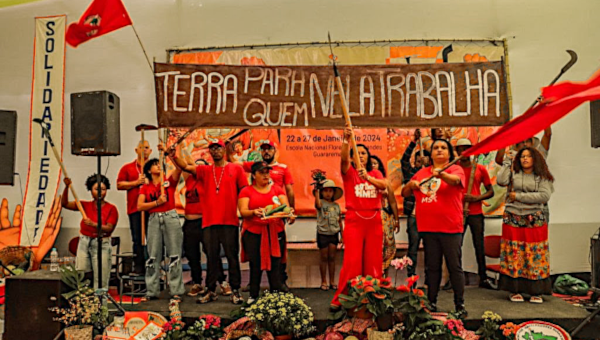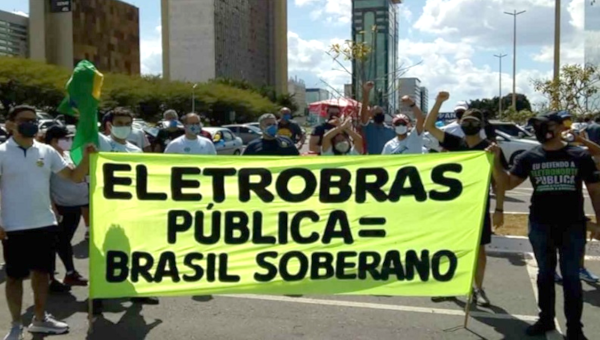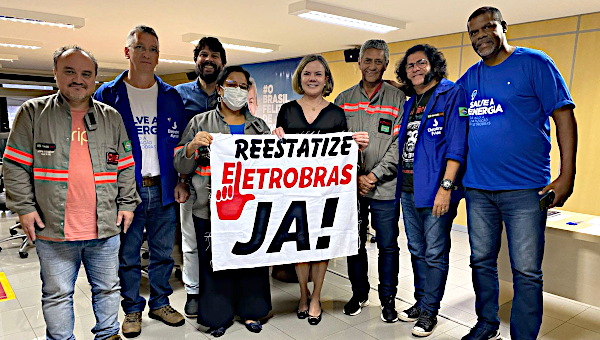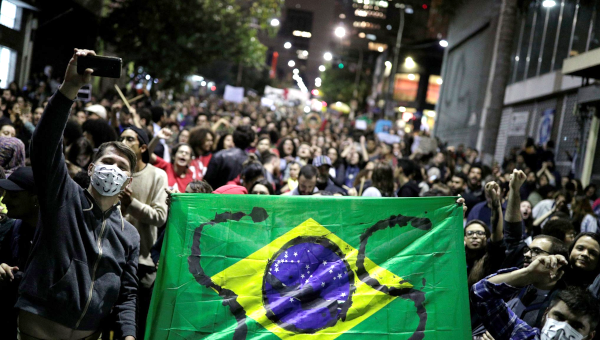Lately, it’s been common to say that the “right has come out of the closet” in Brazil. More precisely, the authoritarian, fascist right, has done so and very publicly for that matter. The revolutionary potential of June 2013 [Ed.: see Bullet No. 851], even if convoluted and smeared by depoliticization, held enough of a threat to require immediate hegemonic renewal, especially at the ideological level. The hegemonic renewal of the right was empowered by the depoliticized aspects of the conflicts exposed in June, such as when desire for more investment in health and education became captured by an aimless fight against corruption permeated by ultra-nationalist, moralist, and authoritarian discourse. Speech that wasn’t acceptable in the past because it would out someone as a bigot came into fashion again.
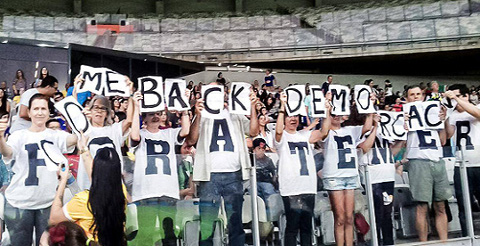
A portion of the right that is configured in authoritarian terms takes pride in denying the history of the military dictatorship and its violations while asking for repression, torture, and a straightforward witch-hunt for communists. Some of their demands border on the absurd, as would be their claim that the Workers’ Party (PT) is communist (when whether it is even leftist is up for debate)
or their opposition to Paulo Freire and his pedagogy, which is praised internationally. Hate is a huge part of the authoritarian right, which we have seen around Donald Trump’s politics in the U.S., but he does not define it alone. The authoritarian right has a precise political project that feeds on hate as well as on depoliticization, crisis, and the fear of social change and justice that could threaten the privilege of a few and the illusion of privilege of millions. This project has a particular and powerful weapon aimed at maintaining common sense: censorship.
Frail Democracy, Authoritarianism’s Birthplace
Censorship is a traditional form of repressing dissent of all cadres under authoritarian regimes. But it also thrives in the context of diminishing democratic rights of liberal democratic regimes tending toward authoritarianism. As much as I would like to blame this on Michel Temer and the post-impeachment government, which is intent on taking away rights and selling Brazil out to the financial and imperialist market, it isn’t this simple. The current form of the authoritarian culture of censorship has ambiguous roots in antipetismo (anti Workers’ Party (PT in Portuguese) sentiment) and its derailment into anti-leftism as well as in the
political choices made by the Workers’ Party in power to give into conservative pressure and stifle diversity and alternative perspectives.
In 2011, Dilma Rousseff vetoed a simple yet advanced project to fight homophobia in Brazilian schools, which involved an
honest discussion of diversity and respect. The educational package was considered to be “gender indoctrination” by the evangelicals in Congress and congressman Jair Bolsonaro (known for his homophobic remarks/attacks and his praise of military dictators). Rousseff
claimed that the material, carefully prepared by the Ministry of Education, was “inadequate” and the end of the story – except that this veto opened the doors to more censorship at the schools, culminating in the Escola Sem Partido project (to be examined later), and to more conspiracy theories about communists and their indoctrination of our children through Paulo Freire and “communist gender ideology.” Rousseff also subordinated women’s struggles to religious opinion by arguing that she would stay out of the abortion debate, and her government’s response to oppression was coloured by punitivist approaches even though there is a lively debate on how
criminalization could worsen the problem of incarceration and the unfairness of the Brazilian justice system against the underprivileged.
Democracy, in the sense of a system that fosters liberty, social rights, diversity, justice, and recognition, wasn’t exactly in its best shape before the impeachment. In 2014, the most conservative congress in Brazil’s recent history was elected and it proceeded to make things worse. The ultra-political scenario in the making to oust Rousseff also contributed to it, since the more people hated the PT, the more they would hate the values they thought the PT represented, despite the current mismatch between the party and its historical roots. This was a turning point for social movements, which although criminalized by the PT governments – who can forget the World Cup persecutions and Rousseff’s own anti-terrorism bill? – began to face more than government surveillance, including actual public
scrutiny and attacks from those captured by the authoritarian right-wing discourse of promoting the Brazilian flag’s motto of “order and progress,” which translates in reality to “status quo renewal.”
The Internet, of course, is a huge part of that process and it can’t be dismissed just because its anonymity and distance nurture hate and
lack of empathy on a normal basis. If we recognize that social media was an important player in June 2013, we have to reckon with the fact
that it was for better and for worse. The new social movements of the right have done well online, as has the space taken up by personalities such as Jair Bolsonaro, Reinaldo Azevedo, Olavo de Carvalho, and a range of other bigots whose audience expands into the regular non-fascist crowd depending on the topic of the day. They benefit from the general conservative nature of common sense in Brazil, which has done a fine job in suppressing the more progressive voices of June and rallying up forces against those who have endured in the left. The authoritarian right also counts on the power of the
mainstream media for amplification. This adds to the most common expression of depoliticization as observed from a Gramscian perspective: people are led to believe in the values of the ruling class and to promote ideas and projects that work directly against them. Their practical consciousness tells them to go one way, but the ideological stronghold of the ruling class, now ever louder, pushes their theoretical consciousness away from an emancipatory perspective. Censorship serves to maintain this arrangement through manufactured consent and to repress those who can escape common sense, which includes the left and its base, as well as a wide range of social groups that hold on to the democratic values mentioned earlier, through coercion and threats of coercion.
Censorship as Coercion
The ruling class resorts to coercion whenever consent is threatened. Consent was threatened at a massive scale in June 2013. What could
not be controlled with the assistance of false claims of neutrality core to the post-political aspects of the period had to be fought by
instigating fear, hate, and disgust at the cultural level and by employing the justice system of the powerful and the police state at the institutional level. The cultural level is arguably more dangerous because it also contributes to censorship as consent and creates a scenario where enemies are everywhere and civility is no longer a requirement for living in a society. It is no wonder that the protests against Dilma Rousseff and in favour of Michel Temer were heavily populated by a mixture of hate, imbecility, and dishonesty. How else to characterize calls against corruption and for corruption at the same time? Or the attacks against teachers and public education? How about the giant inflatable soldier wearing a presidential ribbon in the middle of São Paulo’s Paulista avenue?
These voices belong to generally white people from the middle to the upper classes who claim to stand up for decency and for honesty while
some of their own attack a young man for wearing a red t-shirt or boast of “almost lynching” a famous actress who has spoken against the impeachment. Not to mention the self-proclaimed “communist hunters” or the military reservist who, the other day, spoke with pride of killing communists in Angola. The authoritarian right makes up only a portion of the right-wing that has benefitted from the current political crisis, but this does not make of fascism a small problem. The matter with fascists is often that what they lack in numbers they make up in connections and structural power.
This is where cultural censorship builds into the institutional realm. Societies are more and more litigious today, and this litigation is one of those strange symptoms of the assertion of liberal liberties. While everyone is free to litigate, only a few can do so with the certainty that the rules are in their favour the majority of time. This is why Supreme Court Justice Gilmar Mendes thought it was appropriate to sue Homeless Workers’ Movement leader Guilherme Boulos for moral damages after Boulos published a column on the minister’s nefarious dealings in politics. Boulos won, but this has not discouraged other right-wing actors from suing or pressing charges against left-wing dissidence who voice their criticism and opposition. Mendes has now taken advantage from his judiciary power to propose that the court repeals the registry of the Workers’ Party, which would bring back precedents from the military dictatorship.[1]
Evangelical pastor Silas Malafaia is often threatening to sue everyone, especially journalists and LGBTQ activists, and Jair Bolsonaro gets to press charges against activists because he doesn’t appreciate name-calling unless it comes out of his mouth and is directed at an oppressed group or individual. Institutional censorship doesn’t even have to be personal. Another Supreme Court Justice, Rosa Weber, will be long remembered for subpoenaing Dilma Rousseff to explain her usage of the word “coup” to refer to the impeachment. A month earlier one of the right-wing parties took Rousseff to court to prevent her from addressing the nation about the impeachment. The right-wing opposition also sought to censor her by preventing the elected president from travelling to the United States to make a scheduled speech at the UN headquarters.
The Olympics, which just began in Rio de Janeiro, have been no exception. A previous agreement supported by the Rousseff administration to prevent public displays of protests inside the venues of mega-events is being taken farther than before by the Temer government. Just a few days into the competitions, the national force has thrown out supporters who were protesting with “Temer out” signs or simply shouting it out loud. What Rousseff started in terms of the repression of social movement voices has evolved into a more generalized censorship of speech under Temer.
Although censorship at the educational level is normalized through consent and curriculum control, the fragility of democratic conventions presents opportunities to punish teachers and students for their critical thought. The Escola Sem Partido project of general educational censorship and unitary thinking is still in the oven and we already have teachers being suspended or subpoenaed all over the country. In the state of Paraná, high school teacher Gabriela Viola, whose job is to teach Sociology, was suspended after her students produced a music assignment on Karl Marx, one of the founders of Sociology. The school director argued that the teacher had defamed the school; its employees later repressed a student protest in favour of the teacher with the help of the police. In the Federal District centred around Brasilia, District Deputy Sandra Faraj notified a public school in the periphery for teacher Deneir de Jesus Meirelles’ assignment on gender and sexuality. The theme is part of the national curriculum, but teachers are already being coerced into leaving content out of their classrooms to abide by the code proposed by the right in the Escola Sem Partido project.
Censorship as Consent
Nicknamed “Muzzle Law,” the Escola Sem Partido (School without a Party) project employs coercive methods against teachers in order to stifle
critical thought at its “source” and to create a generation of pacified students and youth. Coercion for the teachers, consent from the students in the long run. Its proponents ask for prison time and heavy fines for teachers accused of the crime of “ideological harassment,” claiming that politics has no place in the classroom and that students are too vulnerable to be exposed to certain subjects. The real objective, however, is to further standardize pedagogical content, which is already heavily criticized in Brazil for its “banking model” of education, so that alternative and critical knowledge is left out of the curriculum. For instance, Brazilian curriculum has few elective options and they are often related to the arts. Technical content around Mathematics and Physics is prioritized over Sociology and History, and the nature of the university entrance system leads schools to focus on communicating the most amount of content in the shortest time. Students become overloaded and often resort to memorizing to make it through exams and all the way to university. Therefore, they are not exactly learning critical thought to its fullest potential today, but the few opportunities they currently have will be taken away if Escola Sem Partido goes through as national policy.
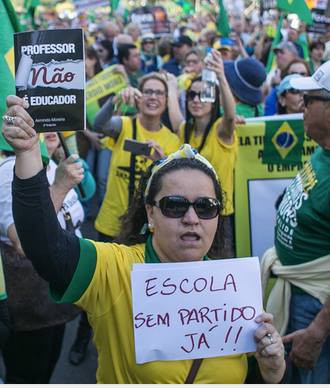 The project is aimed at institutionalizing depoliticization, which can only benefit the status quo and leave unchallenged the information
The project is aimed at institutionalizing depoliticization, which can only benefit the status quo and leave unchallenged the information
fed through the media and common sense reproduction. Its name “without a party” is deceiving with a purpose. The crisis of representation exposed in June 2013 was partly carried into an overall rejection of political parties. This was deemed to be generally progressive by the Brazilian left, considering that the party format in Brazil’s pluriparty system has long been deformed to favour capitalist representation. The depoliticized evolution of anti-party rejection, however, backfired on the left for a variety of
reasons: primarily, the growth of anti-leftism; secondarily, the illusion of neutrality held by the post-political proposals for managing the crisis of representation. This made claims such as “my party is my country” possible, and the ultra-nationalist tie to right-wing politics created the perfect façade for passing the right’s disgust for change and dissident voices as a call for ideological neutrality and against indoctrination. Interestingly, as Rodrigo Santaella points out, the notion of “doctrine” is natural to the religious groups that promote the project rather than the Brazilian left’s critical pedagogical outlook.[2]
Escola Sem Partido is named after a post-political notion of “School without a Party,” but promotes a “School of a Single Party” in the format desired to entrench right-wing values and stifle the leftist consciousness that thrives in critical environments such as schools and working places. This is why the right and its privileged base is so concerned with attacking Paulo Freire, while Antonio Gramsci and Herbert Marcuse are second and third to Karl Marx on the authoritarian right’s foreign ‘most wanted’ list. Freirean pedagogy is actually the opposite of indoctrination, as it fosters self-discovery and the process of creating emancipatory consciousness at the collective level, which poses an immense threat to common sense and the fatalist consent that sustains it. Censorship is an effective way for the right to create consent at all costs, especially during an economic and political crisis such as the way faced in Brazil today. Crises are appropriate periods for emancipatory politicization, as the contradictions of the systems of oppression become more and more apparent. If the left is muzzled through lawsuits and criminalization, and the educational and cultural terrains are censored at the source, the contradictions may still be recognized without their corresponding solutions. By winning the ideological dispute, the right also forecloses spaces of hope and can even manipulate struggle through false answers that reinforce the status quo. After all, censorship is not simply the nullification of the other, but always its continuous replacement with the norm. •


